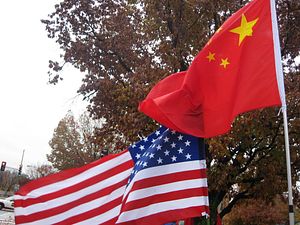Having established that the rise of China is quite likely to continue, and that China is quite likely to seek to modify the existing institutional structure of global politics, it’s now worth thinking about how the United States can manage Chinese influence.
U.S. hegemony has lasted for roughly 73 years, if we date the creation of the current order to 1945. Prior to that, the United States had the world’s largest economy from some point in the late 19th century. The U.S. did not become the world’s pre-eminent military power until perhaps 1943, and did not take a leading role in international institutions (such that they were) prior to 1945.
As the U.S. example suggests, military and economic power do not transmit unproblematically into diplomatic influence. Geographic and political isolation helped make the U.S. a bystander in some of the formative moments of the global international order. And crucially, some states maintained a strong institutional influence even after their moments of military and economic primacy had passed.
The United Kingdom offers some useful comparison; the UK remained a pre-eminent military power until 1945, and a crucial diplomatic player for some time after. The U.S.-UK economic relationship was also similar in some ways to the U.S.-China relationship in terms of trade and investment.
However, while the U.S. and the UK had important differences in perspective, they shared a language and many elements of political culture. London and Washington also faced common enemies in 1917, 1941, and after World War II. It would be excessively optimistic to expect a Beijing-Washington relationship to develop along the same line as the U.S.-British alliance in the 20th century. More likely, U.S.-China relations will see acrimonious competition over several pillars of the emerging international order.
Looking ahead, it is hard to see the United States falling behind many countries other than China and, perhaps, India; the EU already exceeds U.S. GDP, but its future as a foreign policy making institution remains in some doubt. And yet the UK, the EU, Japan, China, and others have played a significant, if not leading, role in the institutionalization of the liberal international order over the past six decades. This suggests that even if China, India, and the EU surpass the U.S. as engines of the global economy, the U.S. will retain significant influence over the structure of international society.
The question then becomes what to do with that influence. One part of the answer lays in institutionalization. Tightening the constraints imposed by multilateral institutions has long been a strategy for managing relative decline; it locks in particular arrangements negotiated from a position of strength. But deeper institutionalization seems to be a bad bet given the rising, transnational populist wave, and in any case every institution that can be made is one that can be broken.
A second part involves recognition of and full accounting with the growing power of China. The United States will not long be able to dictate terms at China’s 12-mile limit, regardless of the number of FONOPs it sails or the lethality of its stealth fighters. This hardly means that Washington needs to concede every element of China’s foreign policy program, but it does suggest that the U.S. needs to consider a posture of strategic modesty. This sounds easy, but the U.S. foreign policy establishment is allergic to thinking about an American role not built upon a foundation of hegemony.
Either way, the United States needs to rethink how it approaches international order; for the first time since the 19th century, it will soon face a situation in which it cannot assume even a “first among equals” position in determining the nature of the international order. This need not be a disaster, but it does require careful strategic thought as to how to bring means and ends together.

































